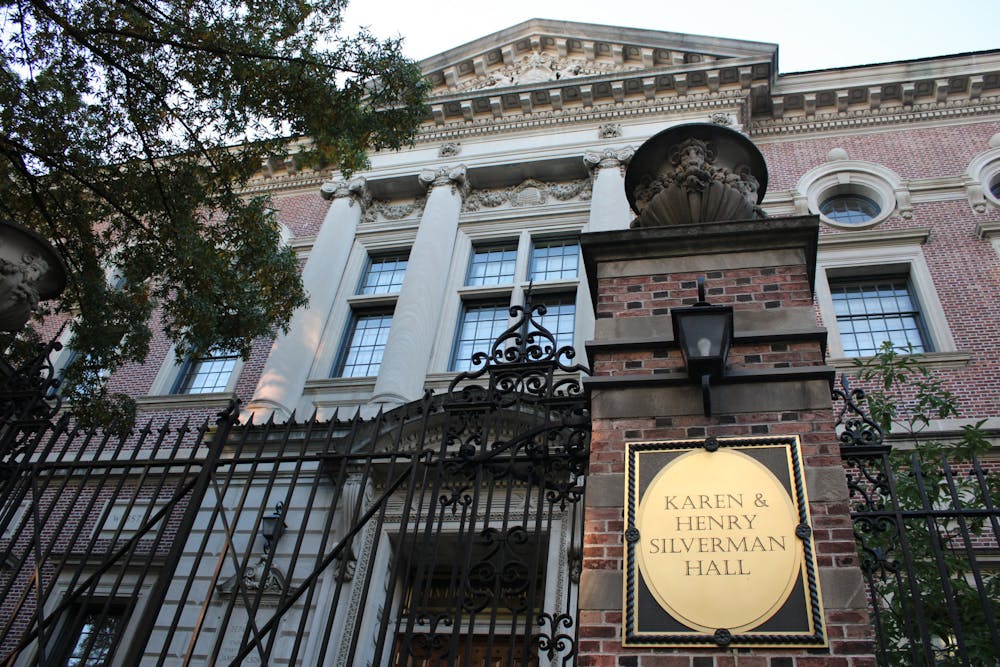
Environmental law professionals spoke about their involvement in opposing a recent Philadelphia Gas Works proposal at the University of Pennsylvania Carey Law School’s Silverman Hall on Oct. 31.
Discussions at the event — which was co-hosted by Penn’s Environmental Law Project and the Democracy Law Project — focused on the implications of limiting public participation in local environmental policy development. The event drew an audience of around 10 Penn Carey Law and other graduate students.
The new proposed regulation by Philadelphia Gas Works prohibits third-party groups from participating in budget proceedings at the Philadelphia Gas Commission. It came after POWER Interfaith, a climate and racial justice organization, became increasingly engaged in legal proceedings involving Philadelphia Gas Works in an effort to push for more clean energy.
The rule has also been opposed by the Public Advocate, a third-party organization representing gas consumers. Under the proposal, full participation in the early stages of the budget proceedings will be limited to lawyers from Philadelphia’s Community Legal Services, an organization that provides free legal representation to low-income renters for housing issues. Currently, public opinion is allowed during early-stage informal discussions.
Speakers at the event included EarthJustice senior supervising attorney Devin McDougall, Community Legal Services of Philadelphia attorney Robert Ballenger, and POWER Interfaith Climate Justice and Jobs Team co-chair Pamela Darville.
POWER Interfaith Climate Justice Director Julie Greenberg said that this type of public participation from third parties has no impact on outcomes because she believes decisions are made before meetings go public. Instead, she said, the organizations are seeking a seat at the table from the beginning, during the budget proceedings, to ensure they can fact-check any of the company’s claims and provide input from those with expertise on the clean energy transition.
Darville told The Daily Pennsylvanian that utilities are a right. She hopes that by opposing the proposal, she can help protect marginalized communities who cannot afford utility bills and are more impacted by climate change. Darville said that if PGW continues its current actions, the city will not be able to meet its carbon neutrality goal for 2050.
“Everyone has a right to have a voice on how their energy is being shaped and what type of energy that's required to be provided to them in a safe and affordable way,” Darville said.
She added that her initial involvement with environmental policy work arose because she grew up in a predominantly Black community. Darville noted that the lack of trees meant communities were prone to extreme heat and floods that they did not have the financial means to deal with, thus reinforcing cycles of poverty.
“I just wanted to contribute to helping marginalized communities that are suffering from climate change,” Darville said. “I remember how it was growing up. If it’s getting worse, those communities will continue to suffer, and that's unacceptable.”
Devin McDougall — who also serves as an advisor for Penn Carey Law’s pro bono program — collaborated with POWER Interfaith in opposing PGW’s proposal. He noted that climate change is an “existential threat” where people from a variety of backgrounds can contribute. He hopes that through the event, members of the Penn community from all backgrounds will be able to participate in the event.
“It’s always a pleasure to come to Penn Law. We get great questions. We get to meet with advocates in training that are serious thinkers and that want to make a difference,” McDougall said. “It’s a pleasure to talk with them.”
Penn environmental studies graduate student Harrison Chubb noted he was pleasantly surprised by the interdisciplinary nature and accessibility of the event. As someone primarily studying environmental science, Chubb said he was glad the event was accessible and helpful to people outside of law. Chubb noted this event was part of a broader shift in universities to hold interdisciplinary conversations and find actionable solutions.
“Every department has a part to play within every problem happening in the world, and especially if we’re talking climate change. This has to be a collaborative effort,” Chubb said.
The Daily Pennsylvanian is an independent, student-run newspaper. Please consider making a donation to support the coverage that shapes the University. Your generosity ensures a future of strong journalism at Penn.
Donate







